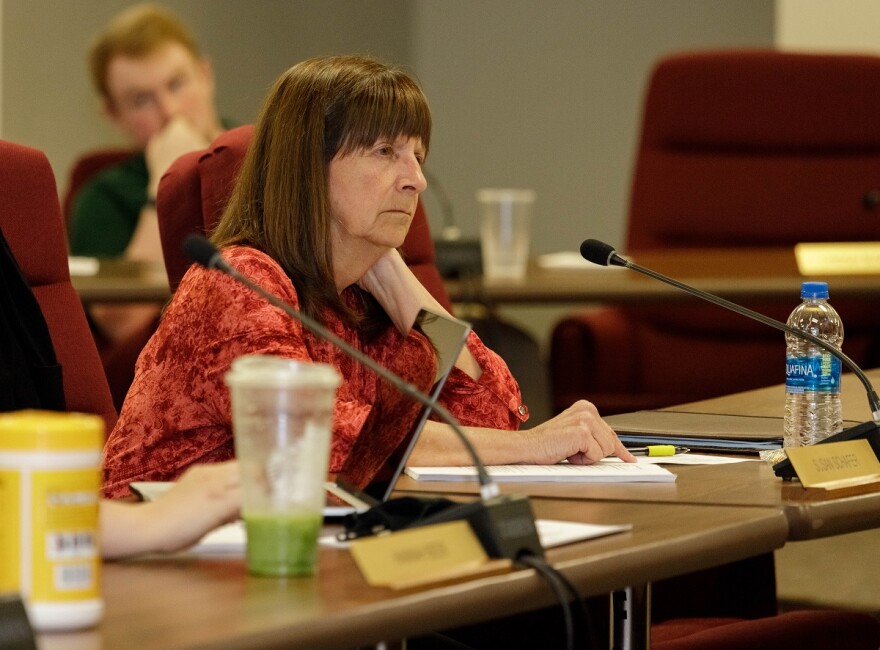The Democratic candidate for south Bloomington’s District 9, Sean Fagan, beat out longtime McLean County Board member Susan Schafer on Tuesday, and the Republican incumbent said it was “not a surprise at all.” In fact, she expected this outcome.
“I think that the divisiveness that has been going on for years throughout the country had people voting party and versus candidate,” she said.
With 14 years on the board, Schafer is well-known for her knowledge of county operations. County Administrator Cassy Taylor said “it will be a big change” come Dec. 2, when new members transition into their roles.
Taylor added that she’s been honored to work with a county board member who dedicated herself to the role and “taking seriously the issues we have in our community to make sure that we’re moving forward and making a better place for our citizens to live and work.”
For at least 8 years, Schafer chaired the board’s Health Committee. She’s also been on various mental health councils over the years, including the Behavioral Health Coordinating Council, which Schafer had hoped to continue serving on following a recent group restructuring. (The board will pick a new health committee chair to become the board representative on the two current behavioral health groups).
Legacy in health and mental health
Her work in the health sector is her legacy from the board, Schafer said. For one, her work to keep the county-run nursing home around and improve its outcomes.
“We went from losing, you know, a couple million dollars a year to this year, where I believe we're actually making a small profit,” she said. “So that's a pretty big turnaround.”
Schafer also helped draft both iterations of McLean County’s Mental Health Action Plan, which has steered the county’s mental and behavioral health initiatives. Meanwhile, for several years she’s been spearheading an overhaul of the county’s electronic data management system for justice, health and homelessness.
The National Association of Counties also recognized Schafer as a champion for social justice and behavioral health through its Familiar Faces Initiative.
“She’s been a force to expand mental health services in our community,” Taylor said. “She has given countless hours to trying to find new, innovative ways that we can support our community.”

A more subtle and unseen part of her work that will hopefully have a lasting impact, Schafer said, were her efforts to build trust and relationships among county officials and community partners.
“It’s a very complex system,” she said. “You’re talking about trying to create systemic change and get people to the table that wouldn't even talk to each other before.”
For example, the Board of Health [BOH] used to have a strained relationship with the County Board. Schafer said she put in extra effort as health committee chair to work with that group, including recently, where two entities worked together to lower BOH reserves.
A full-time job
For the past decade, Schafer said she’s gone to around 15 and 25 meetings per month. While she was an elected official, she treated the task as a full-time job, spending most of her days researching and learning about county operations or how to improve behavioral health outcomes.
A big fan of jigsaw puzzles, Schafer said the county board was her greatest challenge. She’ll spend the next month trying to impart as much of her knowledge as possible, but she said it’s impossible to teach the incoming members everything she’s learned.
“This is a giant jigsaw puzzle, and some of the pieces don't fit, and so you have to be very aware of all the different pieces,” she said. “And then when one piece changes or moves, then you have to know how that might affect another piece.”
Schafer always had a long-term vision in mind, she said, which is how she juggled everything. Now that she’s moving on, Schafer said she’s taking some time for herself and will decide how involved she plans to be going forward.
She emphasized that there’s still work to do to improve health and behavioral health for the community, but she feels good about where she is leaving the board and the councils she served on. The pieces of that jigsaw puzzle are within reach, they just need to be put together by the area providers.
“It’s about them,” she said. “They’re the ones who have to make the [systemic] change, not the county board.”



